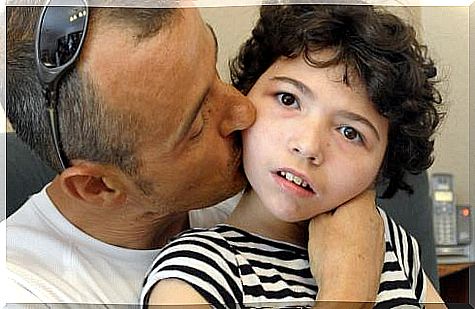Rett’s Syndrome: Symptoms And Treatment

Among the huge variety of diseases and disorders that can affect humans, there is a category of rare diseases. These are diseases that affect five or fewer people per 10,000. One of these is Rett’s syndrome.
The hand washing syndrome
Rett’s syndrome is a genetic disorder that affects the nervous system. It is sometimes nicknamed the handwashing syndrome. This is because people with this condition often make repetitive, involuntary movements, as if washing their hands.
As with most rare diseases , a diagnosis can take time to arrive at. The syndrome is easily confused with autism, developmental disorders or cerebral palsy, leading to delays in treatment.
Rett’s syndrome usually affects girls and women because it is caused by a gene found on the X chromosome. When it occurs in boys, it is usually fatal within a few days of birth.
The Austrian doctor Andreas Rett described this pathology after studying 22 girls who showed the same hand washing movement.

Symptoms of Rett syndrome
During the first months of life, children with this syndrome do not show any signs of abnormality. After six months of age, developmental delays may occur, and infants may lose the abilities they have previously acquired.
Girls with Rett syndrome have low muscle tone and a tendency to avoid eye contact. They can take a long time to learn to speak.
They often show the symptom that Dr. Correctly observed: the repetitive hand washing movement. These children may also suffer from cramps and changes in breathing, especially shortly after waking up.
Rett syndrome is also correlated with delayed growth and limited motor function. In infants, it can cause irritability, uncontrolled crying and excess saliva production. Children with this condition often have abnormal sleep patterns. Their heart rhythm can also be affected.
Due to changes in the autonomic nervous system, girls with Rett’s syndrome often have difficulty chewing, swallowing and digesting food. They can gnash their teeth and move their tongue unintentionally. They can also suffer from stomach cramps, constipation, gallstones and acid reflux.
Three out of four girls with the syndrome suffer from spinal diseases or curvature of the spine. When they walk, their gait is stiff and unstable, often on the tips of their toes. Due to the circulatory problems associated with the syndrome, their hands easily become cold and blue.
Treatment of Rett syndrome
Because Rett’s syndrome is incurable, the purpose of treatment is to relieve the symptoms. This is a progressive disease that worsens over time. However, treatments can improve the quality of life of people with this syndrome.
An interdisciplinary clinical team should be responsible for and implement the treatment, given that symptoms of the condition affect several different systems throughout the body.
Neurologists, pediatricians, psychologists, speech therapists and physiotherapists may be needed.
Treatment of Rett syndrome requires both medication and therapy. The therapy aims to reduce movement difficulties and relieve muscle stiffness. Specialists can also help overcome communication problems associated with the syndrome and reduce anxiety and worry.

Studies of the use of certain drugs, such as L-dopamine, bromocriptine and naltrexone, have been shown to have some positive effects. These medicines have reduced symptoms such as reflux, irritability, hand movements and difficulty breathing.
However, the effects of medication in this condition are not permanent. The complications of Rett syndrome require continuous medical care throughout the patient’s lifetime.
Additional medications, such as antacids, laxatives, antiepileptic drugs and arrhythmias, may be necessary, as well as dietary supplements of vitamin D, calcium and more.
Diet is also an important factor in controlling the symptoms of Rett syndrome. Patients may require a high-calorie, high-fat diet to promote growth and weight gain.
In some cases, surgery may be necessary to correct problems arising from scoliosis and acid regurgitation.
Prognosis of Rett syndrome
The life expectancy of people with this pathology is between 40 and 50 years. However, research on the syndrome is in full swing. Researchers are working to develop therapies that relieve symptoms and identify better diagnostic methods.









